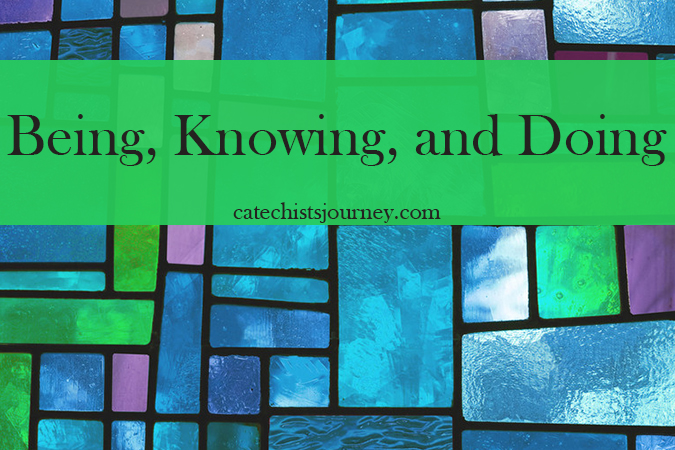
Welcome to the final installment of our series on the three dimensions of catechist formation: Being, Knowing, and Doing, this time focusing on the dimension of Doing.
When I was in college, I decided I wanted to become a teacher, and I wanted to teach religion at a Catholic high school. To achieve this, I double-majored in theology and history, and I also minored in education for the purpose of achieving a teaching certificate for the state of Illinois. I did that because I wanted to excel not only in the Knowing aspect of teaching but also in the Doing aspect. Upon graduating, I was one of two people hired at a Catholic high school to teach religion, both of us with degrees in theology. However, as the year progressed, it was clear that the other new hire was struggling mightily in the classroom, namely because, while he was prepared in the Knowing aspect of teaching, he had no training or preparation in the Doing aspect.
When it comes to proclaiming the Good News of Jesus Christ, there are skills we can and must learn as catechists that will help us to be more effective and engaging. However, most catechists are not professional teachers. It is for that reason that I have dedicated my life to helping catechists learn and master the skills needed to proclaim the Gospel more effectively. I am so grateful that more than 100,000 catechists have benefited from my books, The Catechist’s Toolbox, Beyond the Catechist’s Toolbox, and Preparing Hearts and Minds, all of which focus on the Doing aspect of teaching.
Likewise, the Catechetical Formation Series, which I wrote and co-hosted with Deirdre Mullane, concentrates on this dimension of Doing in sessions one through four.
- Learning Session 1: Getting Started and Getting to Know Your Learners
In this session, catechists will learn the importance and benefits of long-range and short-range planning, as well as development, learning styles, and appropriate activities for each age group they catechize. - Learning Session 2: The Catechetical Process
In this session, catechists will gain an understanding of the four steps of the catechetical process, the eight components of the language of mystery, and how the two come together to help catechists achieve learning outcomes for each session. - Learning Session 3: Prayer and Leading Prayer
In this session, catechists will come to a deeper understanding of prayer. There will be a focus on how to lead others in prayer, including reflective, liturgical, spontaneous, and traditional prayer styles. - Learning Session 4: Facilitation Skills and Handling Difficult Situations
In this session, catechists will learn how to handle difficulties that arise in catechetical situations. They explore how to maintain discipline, respond to disciplinary concerns, and handle difficult situations that may require notifying others (i.e. the catechetical leader, the pastor, or parents).
Access the Catechetical Formation Series here, and benefit from solid three-dimensional catechist formation (Being, Knowing, and Doing). Also be sure to check out The Catechist’s Toolbox, Beyond the Catechist’s Toolbox, and Preparing Hearts and Minds—resources that will help you focus on the Doing dimension of your formation. If you are a catechetical leader and are looking to purchase these books for your catechists, get them for $6 each when buying 15 or more books (in any combination) from the Toolbox series.





This is wonderful teaching.
what I MISSSING, THOUGH, IS THE OTHER END OF THIS TEACHING RELATIONSHIP. Like so many at this time, I am in a rather constrained relationship, being in a ‘nursing home’ – old age, needng support in physical survival. There are not many people I can talk to about spirituality, So, your teaching is so welcome – and, wouldn’t it be nice to be able to talk!
Thank you for what you do, and fr being there!
Johanna Blows (